2019届中考英语复习第一篇语言基础知识第3课七下Units1_5自我检测
- 格式:docx
- 大小:754.56 KB
- 文档页数:9
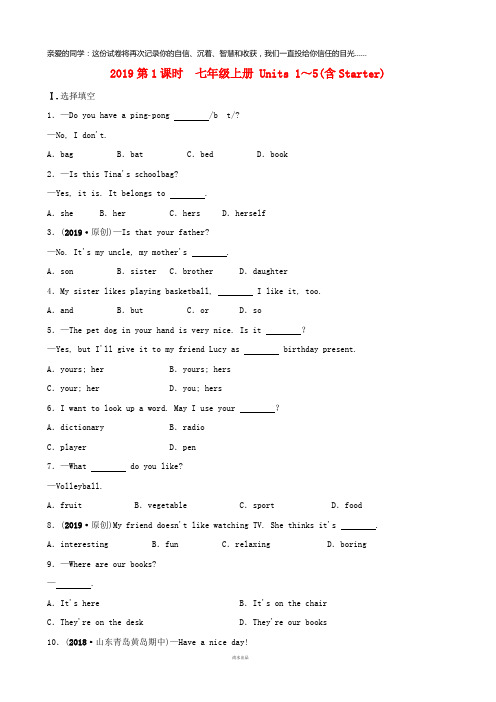
亲爱的同学:这份试卷将再次记录你的自信、沉着、智慧和收获,我们一直投给你信任的目光……2019第1课时七年级上册 Units 1~5(含Starter) Ⅰ.选择填空1.—Do you have a pingpong—No, I don't.A.bag B.bat C.bed D.book2.—Is this Tina's schoolbag?—Yes, it is. It belongs to .A.she B.her C.hers D.herself3.(2019·原创)—Is that your father?—No. It's my uncle, my mother's .A.son B.sister C.brother D.daughter4.My sister likes playing basketball, I like it, too.A.and B.but C.or D.so5.—The pet dog in your hand is very nice. Is it ?—Yes, but I'll give it to my friend Lucy as birthday present. A.yours; her B.yours; hersC.your; her D.you; hers6.I want to look up a word. May I use your ?A.dictionary B.radioC.player D.pen7.—What do you like?—Volleyball.A.fruit B.vegetable C.sport D.food 8.(2019·原创)My friend doesn't like watching TV. She thinks it's . A.interesting B.fun C.relaxing D.boring 9.—Where are our books?— .A.It's here B.It's on the chairC.They're on the desk D.They're our books 10.(2018·山东青岛黄岛期中)—Have a nice day!— .A.You're welcome B.Thank youC.Bye D.Nice to meet youⅡ.完形填空(2017·河南中考)A giant panda ran away from the zoo in London. He walkedand walked and became 1 . He walked into a restaurant, where he found a 2at an empty table. The waiter took the panda's order.After he 3 his dinner, the panda stood up, calmly pulled out a gun which he had hidden, and fired into the air. 4 he turned around and walked toward the door.Naturally, the waiter was horrified(恐惧的), but he tried hard to pull himself together and stopped him for a(n) 5 .The panda said to him, “What do I look like to 6 ?”The waiter answered, “Well, a giant panda, of course.”“That's right,” said the panda. “Look it up.” And he walked out.The waiter called the 7 . When they arrived, the waiter told them the whole story, 8 the panda's words “looking it up”. So th e police officer 9 a young man out to get an encyclopedia(百科全书).The young man returned with the encyclopedia. The officer 10 “panda”and there was the answer, “Giant panda, lives in China, eats shoots(竹笋) and leaves.”1.A.tired B.angry C.crazy D.hungry2.A.seat B.note C.waiter D .newspaper3.A.ordered B.finished C.served D.cooked4.A.So B.Once C.Then D.Also5.A.talk B.excuse C.question D.explanation6. B.him C.you D.them7.A.bosses B.police C.neighbors D.customers8.A.about B.like C.without D.including9.A.sent B.took C.drove D.invited10.A.turned to B.asked for C.looked up D.called onⅢ.阅读理解(2017·山东济南中考)Once upon a time, there was a young man. He lived in asmall village. He was the only child in his family, so his parents loved him very much and did everything for him. He just hung out every day, doing nothing.One day, he met an old man in his village. The old man asked him, “My boy, whydon't you work hard to achieve something when you are young?”The young man replied without care, “Why do I have to be in a hurry? I'm young,so I have plenty of time! Besides, I haven't made any plans for my future yet.”“Time waits for no man!” the old man said. Then he asked the young man to gointo a dark house with him.“I can't see anything!” the young man said.The old man lit a match and said to the young man, “Before the match goes out,pick something in the house as you like.”By the weak light, the young man tried to see the things in it. But before he found something, the match went out, and the house became dark again at once.“Before I could get something, the match had gone out,” the young man said angrily.The old man said, “My boy, your youth(青春) is like the burning match, whichcan only last for a short time. So you shouldn't waste your time!”1.The young man lived in a .A.small city B.small village C.big city D.big town2.The old man asked the young man why he didn't .A.work hard B.hang out C.play games D.do homework3.The old man led the young man into a dark .A.shop B.museum C.house D.kitchen4.What did the young man pick before the match went out?A.A ring. B.A watch. C.A picture. D.Nothing.5.What can we learn from this story?A.Youth is like a burning match. B.It's dangerous to light matches.C.Young people have much time. D.We should look after ourselves.Ⅳ.选词填空阅读短文,从方框中选择适当的单词填空(每词限用一次)。
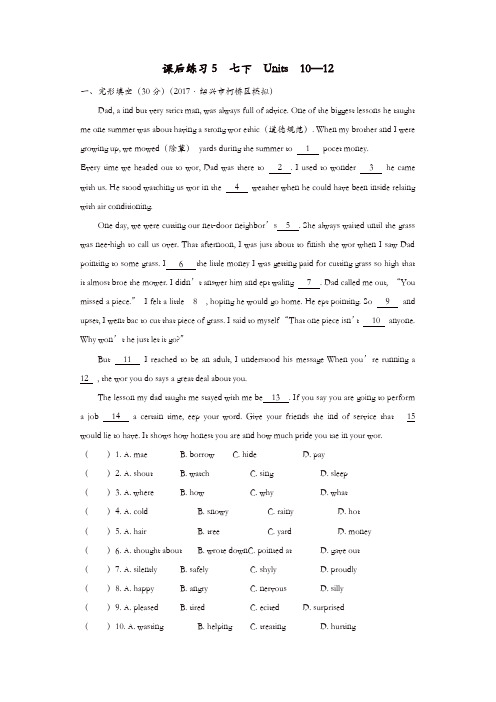
课后练习5 七下Units 10—12一、完形填空(30分)(2017·绍兴市柯桥区模拟)Dad, a ind but very strict man, was always full of advice. One of the biggest lessons he taught me one summer was about having a strong wor ethic(道德规范). When my brother and I were growing up, we mowed(除草)yards during the summer to 1 pocet money.Every time we headed out to wor, Dad was there to 2 . I used to wonder 3 he came with us. He stood watching us wor in the 4 weather when he could have been inside relaing with air conditioning.One day, we were cutting our net-door neighbor’s 5 . She always waited until the grass was nee-high to call us over. That afternoon, I was just about to finish the wor when I saw Dad pointing to some grass. I 6 the little money I was getting paid for cutting grass so high that it almost broe the mower. I didn’t answer him and ept waling 7 . Dad called me out, “You missed a piece.”I felt a little 8 , hoping he would go home. He ept pointing. So 9 and upset, I went bac to cut that piece of grass. I said to myself “That one piece isn’t 10 anyone. Why won’t he just let it go?”But 11 I reached to be an adult, I understood his message When you’re running a 12 , the wor you do says a great deal about you.The lesson my dad taught me stayed with me be 13 . If you say you are going to perform a job 14 a certain time, eep your word. Give your friends the ind of service that 15 would lie to have. It shows how honest you are and how much pride you tae in your wor.()1. A. mae B. borrow C. hide D. pay()2. A. shout B. watch C. sing D. sleep()3. A. where B. how C. why D. what()4. A. cold B. snowy C. rainy D. hot()5. A. hair B. tree C. yard D. money()6. A. thought about B. wrote downC. pointed at D. gave out()7. A. silently B. safely C. shyly D. proudly()8. A. happy B. angry C. nervous D. silly()9. A. pleased B. tired C. ecited D. surprised()10. A. wasting B. helping C. treating D. hurting()11. A. if B. because C. when D. how()12. A. business B. race C. competition D. speech()13. A. professional B. rude C. different D. outgoing()14. A. of B. at C. with D. by()15. A. he B. you C. she D. I二、阅读理解(16分)(2018·湖州市南浔区模拟)Millions of Chinese have been playing a mobile game called Travel Frog recently. You play as the “mother”of a frog who lives alone and enjoys traveling. You need to prepare food and tools for his trips. The frog will send you postcards while he is away.The game’s popularity may have something to do with how lonely people are these days, according to the inhua News Agency. Many players have said that the lonely frog is just lie them. But playing with the frog helps them forget their loneliness(孤独)for a short time.Loneliness seems to be a common problem today. According to The Guardian(《卫报》), about 40 percent of American adults say they’re lonely. And in the U, about one in every five people in the country is “always or often lonely”, The Telegraph(《电讯报》)reported.This might be why the U government declared(宣布)the country’s very first “Minister of Loneliness”in January. The minister’s job is to find ways to help U citiens feel less lonely. The minister’s office will provide more money for activities that connect people together.This loneliness problem may be partly due to social media. When we see pictures of friends having fun or posting selfies(自拍)without us, we may compare their “perfect”lives with our own and feel upset and lonely.But we should remember that no one is destined(注定)to be lonely. As U poet John Donne once wrote, “No man is an island, entire of itself; every man is a piece of the continent (陆地), a part of the main.”()1. What do players do while playing Travel Frog?A. Build houses for their frogs.B. Write postcards to their frogs.C. Choose places for their frogs to travel.D. Prepare food and tools for their frogs’trips.()2. The purpose of introducing Travel Frog is to__________ .A. tell us how to play this gameB. lead in more popular gamesC. tell us how popular this game isD. lead in the problem of loneliness()3. To deal with loneliness, Minister of Loneliness__________ .A. designed the game Travel FrogB. found ways to get people togetherC. reported the problem in the newspaperD. stopped people from using social media()4. What does the last paragraph mean?A. In fact, we are not lonely.B. Loneliness is a big problem.C. Everyone should live the way he lies.D. It is no use comparing ourselves with others.三、词汇运用(15分)A)用方框中所给词的适当形式填空,每词限用一次。
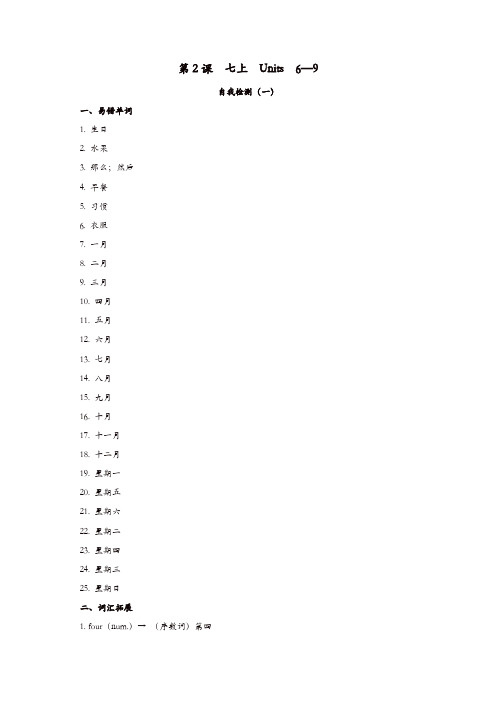
第2课七上Units 6—9自我检测(一)一、易错单词1. 生日2. 水果3. 那么;然后4. 早餐5. 习惯6. 衣服7. 一月8. 二月9. 三月10. 四月11. 五月12. 六月13. 七月14. 八月15. 九月16. 十月17. 十一月18. 十二月19. 星期一20. 星期五21. 星期六22. 星期二23. 星期四24. 星期三25. 星期日二、词汇拓展1. four(num.)→(序数词)第四→四十→第四十2. wee(n.)→(adj.&adv.)每周的(地)3. eat(v.)→(现在分词)→(过去式)→(过去分词)吃4. tae(v.)→(过去式)→(过去分词)买下;拿;取→(反义词)带;取5. tomato(n.)→(pl.)西红柿6. health(n.)→(adj.)健康的→(adv.)健康地7. with(prep.)→(反义词)没有8. real(adj.)→(adv.)真正地9. shoe(n.)→(pl.)鞋10. woman(n.)→(pl.)女子11. well(adv. & interj.)→(比较级)较好的(地);更好的(地)→(最高级)最好的;最好地12. twelve(num.)→(adj.&num.)第十二13. twenty(num.)→(adj.&num.)第二十14. sell(v.)→(过去式/过去分词)出售;销售;卖→(n.)特价销售;出售15. buy(v.)→(过去式/过去分词)购买;买16. art(n.)→(n.)艺术家17. science(n.)→(n.)科学家→(adj.)科学(上)的18. music(n.)→(adj.)音乐的;有音乐的→(n.)音乐家19. busy(adj.)→(adv.)忙碌地→(n.)生意;商业→(比较级)更忙的→(最高级)最忙的20. free(adj.)→(adv.)不受限制地;无拘无束地;自由地→(n.)自由21. use(v. & n.)→(adj.)有用的;有益的→(adj.)无用的;无价值的22. happy(adj.)→(反义词)不快乐的;不幸福的;难过的;悲伤的→(adv.)快乐地;高兴地;满足地→(n.)幸福23. much(pron. & adj.)→(比较级)更多(的)→(最高级)最多;大多数24. fat(adj.)→(n.)脂肪,肥肉→(比较级)较胖的→(最高级)最胖的25. big(adj.)→(比较级)更大的→(最高级)最大的→(反义词)小的;小号的26. month(n.)→(pl.)月份自我检测(二)一、词组短语1. 健康食品2. 晚餐吃……3. 忙于(做)某事4. 吃早/午/晚饭5. 一双白袜子6. 生日快乐。
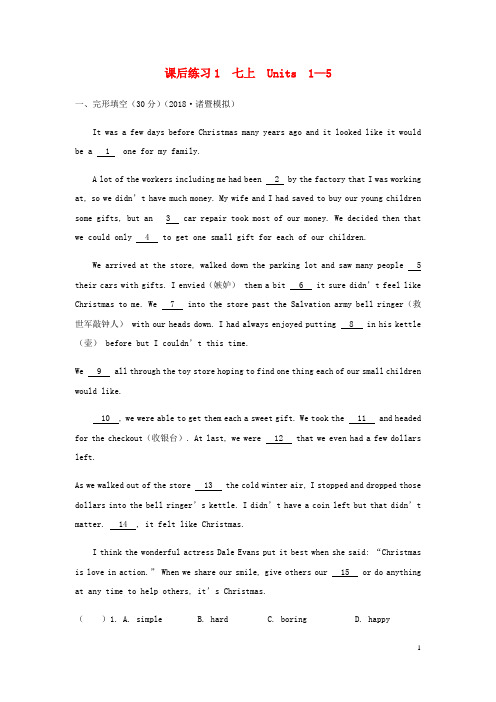
课后练习1 七上 Units 1—5一、完形填空(30分)(2018·诸暨模拟)It was a few days before Christmas many years ago and it looked like it would be a 1 one for my family.A lot of the workers including me had been 2 by the factory that I was working at, so we didn’t have much money. My wife and I had saved to buy our young children some gifts, but an 3 car repair took most of our money. We decided then that we could only 4 to get one small gift for each of our children.We arrived at the store, walked down the parking lot and saw many people 5 their cars with gifts. I envied(嫉妒) them a bit 6 it sure didn’t feel like Christmas to me. We 7 into the store past the Salvation army bell ringer(救世军敲钟人) with our heads down. I had always enjoyed putting 8 in his kettle (壶) before but I couldn’t this time.We 9 all through the toy store hoping to find one thing each of our small children would like.10 , we were able to get them each a sweet gift. We took the 11 and headed for the checkout(收银台). At last, we were 12 that we even had a few dollars left.As we walked out of the store 13 the cold winter air, I stopped and dropped those dollars into the bell ringer’s kettle. I didn’t have a coin left but that didn’t matter. 14 , it felt like Christmas.I think the wonderful actress Dale Evans put it best when she said: “Christmasis love in action.” When we share our smile, give others our 15 or do anything at any time to help others, it’s Christmas.()1. A. simple B. hard C. boring D. happy()2. A. cheered up B. taken outC. turned downD. kicked off()3. A. unexpected B. uncomfortableC. unbelievableD. unfair()4. A. want B. decide C. afford D. refuse()5. A. repairing B. filling C. driving D. cleaning ()6. A. unless B. but C. although D. because()7. A. hurried B. moved C. broke D. knocked ()8. A. anything B. everything C. something D. nothing ()9. A. came B. searched C. flew D. followed()10. A. Hopefully B. Awfully C. Thankfully D. Peacefully ()11. A. cars B. candies C. toys D. fruits()12. A. interested B. disappointed C. worried D. surprised()13. A. around B. into C. from D. behind()14. A. Suddenly B. Luckily C. Quietly D. Naturally()15. A. sadness B. business C. kindness D. shyness二、阅读理解(16分)(2018·临海模拟)As Amy Hagadorn rounded the corner across the hall from her classroom, she met a tall boy from the fifth grade running in the opposite direction.“Watch it, dwarf(矮子),” the boy shouted, as he kept away from the little third grader. Then, the boy imitated(模仿) the way Amy limped(跛行) when she walked.Amy closed her eyes for a moment.“Ignore(忽视) him!” she told herself as she headed for her classroom.It wasn’t as if he were the only one. It seemed that ever since Amy started the third grade, someone teased her every single day. The teasing made Amy feel lonely.Back home at the dinner table that evening, Amy was quiet. Her mother knew that things were not going we ll at school. That’s why she was happy to have some exciting news to share with her daughter.“There’s a Christmas Wish Competition in the newspaper,” she said. “Write a letter to Santa Claus and you might win a prize.”Taking out a pencil and paper, Amy went to work on her letter. She wrote: Dear Santa Claus,My name is Amy. I am 9 years old. I have a problem at school. Can you help me, Santa? Kids laugh at me because of the way I walk and run and talk. I have cerebral palsy(大脑性瘫痪). I just want one day when no one laughs at me.Love,Amy The next day, a picture of Amy and her letter to Santa Claus made the front page of the News Sentinel. The little girl’s story spread quickly. She asked for such a simple yet unusual Christmas gift—just one day without teasing.Many people thanked Amy for being brave enough to speak up. Others encouraged her to ignore teasing and to carry her head high.Amy did get her wish of a special day without teasing. Teachers and students talked together about how bad teasing can make others feel.()1. The underlined word “teased” means “_________”.A. argued withB. talked aboutC. cared forD. made fun of()2. Amy’s mother shared the news of a Christmas Wish Competition that day because she knew_________ .A. Amy’s s chool life was not goodB. her daughter was teased by a fifth graderC. the competition would change Amy’s lifeD. Amy’s sickness went much worse than before()3. We can infer(推断) from the underlined sentence “Back home at the dinner table that evening, Amy was quiet.” that Amy was_________.A. nervousB. sadC. happyD. moved()4. What’s the best title(标题) for the passage?A. Amy’s DayB. Mother’s LoveC. Amy and a Tall BoyD. Amy’s Christmas Wish三、词汇运用(15分)A)用方框中所给词的适当形式填空,每词限用一次。
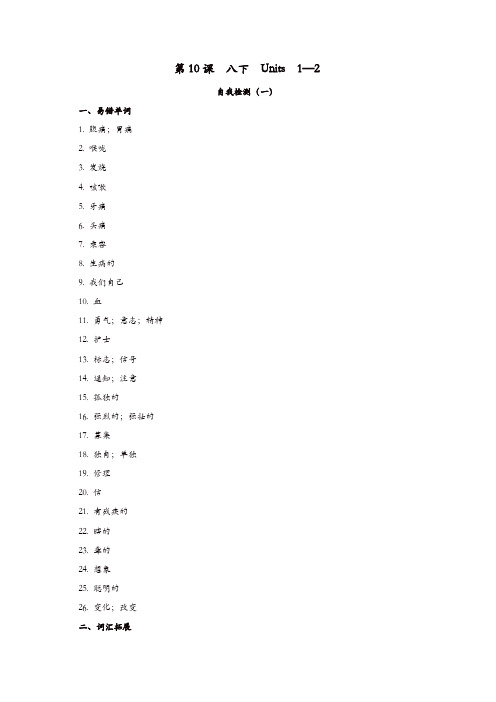
第10课八下Units 1—2自我检测(一)一、易错单词1. 腹痛;胃痛2. 喉咙3. 发烧4. 咳嗽5. 牙痛6. 头痛7. 乘客8. 生病的9. 我们自己10. 血11. 勇气;意志;精神12. 护士13. 标志;信号14. 通知;注意15. 孤独的16. 强烈的;强壮的17. 募集18. 独自;单独19. 修理20. 信21. 有残疾的22. 瞎的23. 聋的24. 想象25. 聪明的26. 变化;改变二、词汇拓展1. foot(n.)→(pl.)脚;足2. lie(v.)→(过去式)→(过去分词)→(现在分词)平躺;躺3. hurt(v.)→(过去式/过去分词)→(现在分词)(使)疼痛;受伤4. hit(n. & v.)→(过去式/过去分词)→(现在分词)(用手或器具)击;打5. sic(adj.)→(n.)疾病;生病6. climb(v.)→(n.)登山者;攀登者7. nife(n.)→(pl.)刀8. important(adj.)→(n.)重要;重要性9. cheer(v.)→(adj.)快乐的;愉快的;高兴的10. strong(adj.)→(adv.)强有力地;坚强地→(反义词)虚弱的;无力的11. feel(v.)→(过去式/过去分词)感到;感觉→(n.)感觉;感触12. satisfy(v.)→(n.)满足;满意→(adj.)感到满足的;感到满意的13. own(v. & adj.)→(n.)物主;主人14. brea(v.)→(adj.)破损的;残缺的15. able(adj.)→(n.)能力→(v.)使丧失能力;使残废→(adj.)丧失能力的;有残疾的16. imagine(v.)→(n.)想象;想象力17. difficult(adj.)→(n.)困难;难题18. train(v.)→(n.)训练;培训→(n.)教练;训练员19. ind(adj.)→(n.)仁慈;善良20. she(pron.)→(人称代词宾语)她→(形容词性物主代词)她的→(名词性物主代词)她的→(反身代词)她自己21. we(pron.)→(人称代词宾语)我们→(形容词性物主代词)我们的→(名词性物主代词)我们的→(反身代词)我们自己自我检测(二)一、词组短语1. 感冒2. 躺下3. 量体温4. 发烧5. 休息6. 下车7. 立即;马上8. 陷入麻烦9. 习惯于(做)某事10. 冒险11. 用尽12. 切除13. 从……出14. 放弃15. 打扫16. 分发17. 想出18. 推迟19. 打电话给(某人)20. 曾经常常做……;过去常常做……21. 照顾22. 试用;参加……选拔23. 修理24. 像25. 建起26. 有影响;有作用27. 喉咙痛28. 呼救29. 毫不犹豫30. 等下一班车31. 考虑某人自己32. 穿上33. 介意做某事34. 在……岁时35. 担心36. 我的一位朋友37. 对……感到兴奋38. 帮某人脱离困境39. 对做某事感到幸运40. 在……方面强41. 起到很好的效果二、重点句型1. 令他惊讶的是,他们都同意和他一起去。
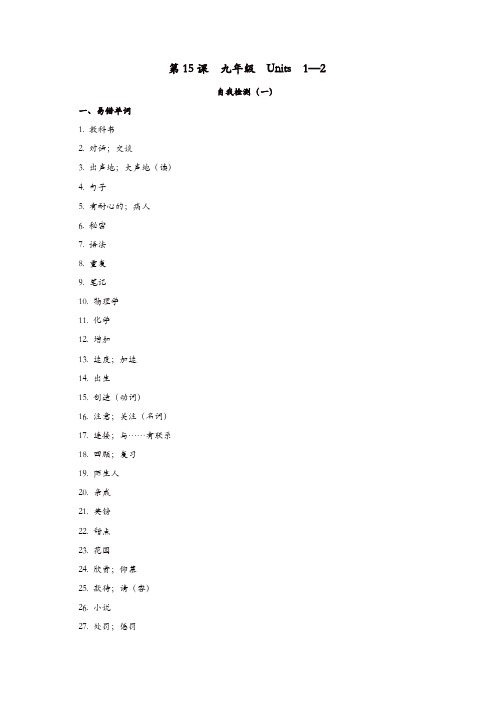
第15课九年级Units 1—2自我检测(一)一、易错单词1. 教科书2. 对话;交谈3. 出声地;大声地(读)4. 句子5. 有耐心的;病人6. 秘密7. 语法8. 重复9. 笔记10. 物理学11. 化学12. 增加13. 速度;加速14. 出生15. 创造(动词)16. 注意;关注(名词)17. 连接;与……有联系18. 回顾;复习19. 陌生人20. 亲戚21. 英镑22. 甜点23. 花园24. 欣赏;仰慕25. 款待;请(客)26. 小说27. 处罚;惩罚28. 警告;告诫29. 现在;礼物二、词汇拓展1. pronounce(v.)→(n.)发音;读音2. patient(adj. & n.)→(n.)耐心;毅力3. epress(v.)→(n.)表情;表示;表达方式4. discover(v.)→(n.)发现;发觉5. able(adj.)→(n.)能力;才能6. create(v.)→(adj.)有创造力的;创造性的7. active(adj.)→(adv.)活跃地→(n.)活动8. connect(v.)→(n.)连接;与……有联系9. wise(adj.)→(adv.)明智地;聪明地10. strange(adj.)→(n.)陌生人11. steal(v.)→(过去式)→(过去分词)偷;窃取12. lay(v.)→(过去式/过去分词)放置;下蛋13. lie(v.)→(过去式)→(过去分词)平躺;处于14. die(v.)→(n.)死;死亡→(adj.)死的;失去生命的→(现在分词)死;死去15. business(n.)→(n.)商人16. punish(v.)→(n.)处罚;惩罚17. warm(adj.)→(n.)温暖18. spread(v.)→(过去式/过去分词)传播;展开;蔓延19. memory(n.)→(v.)记忆20. now(v.)→(n.)知识21. loud(adj.)→(adv.)喧闹地;大声地;响亮地自我检测(二)一、词组短语1. 注意2. 摆开;布置3. 最终成为4. 通过向老师求助5. 大声朗读练习发音6. 提高某人说的技能7. 太难而不能理解英语口语8. 一个单词一个单词地读9. 对……有耐心10. 一部名叫……的英文电影11. 小事一桩。
第2课七上Units 6—9自我检测(一)一、易错单词1. 生日2. 水果3. 那么;然后4. 早餐5. 习惯6. 衣服7. 一月8. 二月9. 三月10. 四月11. 五月12. 六月13. 七月14. 八月15. 九月16. 十月17. 十一月18. 十二月19. 星期一20. 星期五21. 星期六22. 星期二23. 星期四24. 星期三25. 星期日二、词汇拓展1. four(num.)→(序数词)第四→四十→第四十2. wee(n.)→(adj.&adv.)每周的(地)3. eat(v.)→(现在分词)→(过去式)→(过去分词)吃4. tae(v.)→(过去式)→(过去分词)买下;拿;取→(反义词)带;取5. tomato(n.)→(pl.)西红柿6. health(n.)→(adj.)健康的→(adv.)健康地7. with(prep.)→(反义词)没有8. real(adj.)→(adv.)真正地9. shoe(n.)→(pl.)鞋10. woman(n.)→(pl.)女子11. well(adv. & interj.)→(比较级)较好的(地);更好的(地)→(最高级)最好的;最好地12. twelve(num.)→(adj.&num.)第十二13. twenty(num.)→(adj.&num.)第二十14. sell(v.)→(过去式/过去分词)出售;销售;卖→(n.)特价销售;出售15. buy(v.)→(过去式/过去分词)购买;买16. art(n.)→(n.)艺术家17. science(n.)→(n.)科学家→(adj.)科学(上)的18. music(n.)→(adj.)音乐的;有音乐的→(n.)音乐家19. busy(adj.)→(adv.)忙碌地→(n.)生意;商业→(比较级)更忙的→(最高级)最忙的20. free(adj.)→(adv.)不受限制地;无拘无束地;自由地→(n.)自由21. use(v. & n.)→(adj.)有用的;有益的→(adj.)无用的;无价值的22. happy(adj.)→(反义词)不快乐的;不幸福的;难过的;悲伤的→(adv.)快乐地;高兴地;满足地→(n.)幸福23. much(pron. & adj.)→(比较级)更多(的)→(最高级)最多;大多数24. fat(adj.)→(n.)脂肪,肥肉→(比较级)较胖的→(最高级)最胖的25. big(adj.)→(比较级)更大的→(最高级)最大的→(反义词)小的;小号的26. month(n.)→(pl.)月份自我检测(二)一、词组短语1. 健康食品2. 晚餐吃……3. 忙于(做)某事4. 吃早/午/晚饭5. 一双白袜子6. 生日快乐。
第16课九年级Units 3—4自我检测(一)一、易错单词1. 邮票2. 在旁边3. 明信片4. 仓促;急促5. 葡萄6. 邮件7. 迷人的8. 方便的9. 角落10. 礼貌地11. 要求;请求12. 方向;方位13. 正确的;恰当的14. 发言者15. 不礼貌的16. 地址17. 地下的;地铁18. 课程;学科19. 有幽默感的20. 采访;面试21. 敢于22. 私人的23. 民众;公开的24. 影响25. 不常;很少26. 自豪的27. 自豪;骄傲28. 缺席的;不在的29. 确切地;精确地30. 普遍的;总的;将军二、词汇拓展1. suggest(v.)→(n.)建议;提议2. center(n.)→(adj.)中心的;中央的3. east(n.)→(adj.)东方的;东部的4. convenient(adj.)→(n.)便利;方便→(反义词)不方便的;不便利的5. polite(adj.)→(adv.)礼貌地;客气地→(反义词)不礼貌的;粗鲁的6. direct(adj.)→(反义词)间接的→(n.)方向;方位7. correct(adj.)→(adv.)正确地;恰当地8. spea(v.)→(n.)讲(某种语言)的人;发言者→(过去式)→(过去分词)说(某种语言);说话9. whom(pron.)→(pron.)谁(主格)→(pron.)谁的10. humor(n.)→(adj.)有幽默感的;滑稽的;有趣的11. silent(adj.)→(n.)沉默;缄默;无声→(adv.)不说话地;沉默地12. interview(v. & n.)→(n.)面试者;采访者13. Asia(n.)→(adj.&n.)亚洲(人)的;亚洲人14. Europe(n.)→(adj.)欧洲的;欧洲人的15. Africa(n.)→(adj.)非洲的;非洲人的16. Britain(n.)→(adj.)英国的;英国人的17. absent(adj.)→(n.)缺席;不在→(反义词)出席的18. fail(v.)→(n.)失败→(反义词)成功19. eamine(v.)→(n.)考试;检查20. eact(adj.)→(adv.)确切地;精确地21. pride(n.)→(adj.)自豪的;骄傲的22. general(adj.)→(adv.)普遍地;广泛地23. speech(n.)→(pl.)演讲24. crowd(n. & v.)→(adj.)拥挤的→(adj.)不拥挤的25. deal(v.)→(过去式/过去分词)对付;对待26. require(v.)→(n.)所需的(或所要的)东西自我检测(二)一、词组短语1. 请再说一次2. 时常;有时3. 公开地4. 为……骄傲5. 亲自6. 为……感到自豪7. 在银行旁边8. 经过书店9. 在……普遍使用10. 抓住某人的手11. 在去……的路上12. 经过鲍勃叔叔的饭店13. 在门口14. 沿着这条街向东走15. 有礼貌地求助16. 听起更有礼貌17. 期待……18. 匆忙19. 在第三层楼20. 变红21. 一位19岁的亚洲流行明星22. 一直备受关注23. 想着放弃24. 需要很多天赋才能成功25. 成功到达巅峰26. 读关于欧洲历史的书27. 缺席28. 做决定29. 建议某人做某事30. 使某人惊讶的是31. 害怕孤独32. 对某人有巨大影响二、重点句型1. 当你在国外旅游时,知道如何礼貌地寻求帮助很重要。
第18课九年级Units 7—8自我检测(一)一、易错单词1. 冒烟;吸烟______________________2. 兼职的______________________3. 极小的______________________4. 田野;场地______________________5. 举起;电梯______________________6. 青少年______________________7. 诗______________________8. 社区______________________9. 机会______________________10. 完成(困难的事)______________________11. 支持______________________12. 进;进去______________________13. 谁的______________________14. 卡车______________________15. 兔;野兔______________________16. 野餐______________________17. 任何人______________________18. 外套______________________19. 困倦的______________________20. 圆圈;圈出______________________21. 接受;收到______________________22. 着陆;降落______________________23. 目的;目标______________________24. 阻止;阻挠______________________25. 位置;地方______________________26. 胜利;成功______________________27. 敌人______________________二、词汇拓展1. safe(adj.)→___________(adv.)安全地→___________(n.)安全;安全性2. regret(v.&n.)→___________(过去式/过去分词)感到遗憾;懊悔→___________(现在分词)→___________(adj.)后悔的3. educate(v.)→___________ (过去式/过去分词)教育;教导→___________(n.)教育→___________(adj.)教育的;有教育意义的4. manage(v.)→___________(n.)经理;经营者5. society(n.)→___________(adj.)社会的6. choose(v.)→___________(n.)选择;挑选→___________(过去式)→___________(过去分词)选择;选出7. energy(n.)→___________(adj.)精力充沛的;充满活力的8. value(v. & n.)→___________(adj.)贵重的;很有用的;宝贵的9. noise(n.)→___________(adj.)吵闹的10. wolf(n.)→___________(pl.)狼11. sleep(v.)→___________(adj.)困倦的;瞌睡的→___________(adj.)睡着的12. epress(v.)→___________(n.)词语;表达方式;表达13. Britain(n.)→___________(adj.)英国的;英国人的14. lead(v.)→___________(过去式/过去分词)领导;引导→___________(现在分词)→___________(n.)领导;领袖15. medicine(n.)→___________(pl.)药品→___________(adj.)医疗的;医学的16. policeman(n.)→___________(pl.)男警察17. badly(adv.)→___________(adj.)坏的;糟的→___________(比较级)更差的(地)→___________(最高级)最差的(地)自我检测(二)一、词组短语1. 后悔顶嘴______________________2. 挡……的路______________________3. 不但……而且……______________________4. 获得驾照______________________5. 不行______________________6. 16岁的青少年______________________7. 担心你的安全______________________8. 穿耳洞______________________9. 停止做某事______________________10. 对……感到兴奋______________________11. 待在我旁边______________________12. 在田间奔跑______________________13. 使……远离……______________________14. 设法做成某事______________________15. 通过考试______________________16. 数学考试不及格______________________17. 参加补考______________________18. 尽可能多地______________________19. 不反对(做)某事______________________20. 允许某人做某事______________________21. 不赞同______________________22. 被关掉______________________23. 18岁以下的青少年_________________________________24. 属于______________________25. 在野餐时______________________27. 把某物捡起______________________28. 一些不寻常的事______________________29. 逃跑______________________30. 做……有乐趣______________________31. 发出噪音______________________32. 感到困倦______________________33. 追赶______________________34. 跑去赶车______________________35. 它最大的神秘之一_________________________________36. 与……交流______________________37. 提出______________________38. 感觉某人/某物做……_________________________________39. 在很长的一段时期内_________________________________40. 在电话上与某人交谈_________________________________二、重点句型1. 我认为应该被允许自己做这个选择。
第6课八上Units 1—3自我检测(一)一、易错单词1. 头脑;心智2. 每人;人人3. 好像;似乎4. 雨伞5. 充足的;足够的6. 家务劳动;家务事7. 几乎不8. 大概;或许9. 虽然10. 以;凭借;穿过11. 杂志;期刊12. 几乎;差不多13. 必需的14. 两个都15. 成绩等级16. 内心;心脏17. 共用;分摊18. 信息;消息(不可数名词)二、词汇拓展1. wonder(v. & n.)→(adj.)极好的2. bore(v. & n.)→(adj.)无聊的;令人厌烦的→(adj.)厌倦的;烦闷的3. enjoy(v.)→(adj.)有乐趣的;令人愉快的4. activity(n.)→(pl.)活动5. decide(v.)→(n.)决定;决心6. build(v.)→(过去式/过去分词)建造→(n.)建筑物7. trade(n. & v.)→(n.)商人8. wait(v.)→(n.)男服务员;侍者→(n.)女服务员9. hunger(n.)→(adj.)饥饿的10. lie(v. & n.)→(反义词)不喜爱(的事物);厌恶(的事物)11. brea→(过去式)→(过去分词)(使)破;裂;碎;损坏12. die(v.)→(n.)死;死亡→(adj.)死的→(现在分词)13. little(adj.)→(比较级)较少的;更少的→(最高级)最少的;最小的14. much/many(adj.)→(比较级)更多(的)→(最高级)最多(的);大多数(的)15. loud(adj.)→(adv.)喧闹地;大声地;响亮地16. quiet(adj.)→(adv.)轻声地;轻柔地;安静地17. compete(v.)→(n.)比赛;竞赛;竞争→(n.)参赛者;竞争者18. clear(adj.)→(adv.)清楚地;清晰地;明白地19. win(v.)→(过去式/过去分词)赢;获胜;赢得→(n.)获胜者;赢家20. talent(n.)→(adj.)有才能的;能干的21. say(v.)→(n.)谚语;格言22. laugh(v.)→(n.)笑声23. true(adj.)→(adv.)真正地;确实地→(n.)实情;事实自我检测(二)一、词组短语1. 相当多;不少2. 当然3. 感受到……;想要做……4. 好久不见5. 去某个有趣的地方6. 只有;仅仅7. 似乎感到无聊8. 下大雨9. 再走两小时10. 最喜欢11. 叫我坚持下去12. 激动地跳上跳下13. 至少14. 例如15. 多于16. 少于17. 每周两次18. 对我的健康有益19. 身心健康20. 去牙医处洗牙21. 唱得更清楚22. 头发较短的那位23. 音乐方面有天赋24. 使我笑25. 与……不同26. 激发我的潜能27. 不够用功28. 和……一样29. 事实上30. 与……相像的二、重点句型1. 这里阳光明媚而且天气炎热,因此我们决定去我们旅馆附近的海滩。
1
第3课 七下 Units 1—5
自我检测(一)
一、易错单词
1。 加入
2。 吉他
3。 俱乐部;社团
4。 交谈;说话
5。 有时
6。 介于……之间
7。 练习
8。 可怕的
9。 熊猫
10。 动物
11。 从不;绝不
12。 分钟
13。 安静的
14。 组;群
15。 品尝
二、词汇拓展
1。 sing(v。)→ (n。)歌手;歌唱家
→ (过去式)
2
→ (过去分词)唱歌
2。 swim(v。)→ (过去式)
→(过去分词)
→(现在分词)游泳
3。 dance(v。)→ (n。)跳舞者
4。 draw(v。)→(过去式)
→(过去分词)画
5。 story(n。)→ (pl。)故事;小说
6。 write(v。)→ (过去式)
→ (过去分词)书写
→ (n。)作者;作家
7。 make(v。)→ (过去式/过去分词)使成为;制造
8。 teach(v。)→ (过去式/过去分词)教;讲授
9。 tooth(n。)→ (pl。)牙齿
10。 usual(adj。)→ (反义词)不寻常的;与众不同的
→ (adv。)通常地;正常地;一般地;经常地
11。 work (v。 & n。)→ (n。)工人
→ (pl。)作品
12。 fun(n。)→ (adj。)奇怪的;滑稽好笑的
13。 clean(v。)→ (n。)清洁工
14。 quick(adj。)→ (adv。)很快地
3
15。 life(n。)→ (pl。)生命;生活
16。 ride(v。)→ (过去式)
→ (过去分词)骑
17。 drive(v。)→ (过去式)
→ (过去分词)开车;驾驶
→ (n。)驾驶员;司机
18。 live(v。)→ (adj。)活着的;在世的
→ (adj。)充满活力的;生机勃勃的;活泼的
19。 across(prep。)→ (v。)穿过;横过;越过
→(n。)十字路口
20。 many(adj。)→ (比较级)更多的(地)
→ (最高级)最多的(地)
21。 village(n。)→ (n。)村民
22。 leave(v。)→ (过去式/过去分词)离开;出发
23。 true(adj。)→ (adv。)真正地
→ (n。)真实;真相
24。 fight(v。)→ (过去式/过去分词)打架;争吵
25。 bring(v。)→(过去式/过去分词)拿来;取来;带来
26。 important(adj。)→ (n。)重要性
→ (反义词)不重要的
27。 quiet(adj。)→ (adv。)安静地;平静地
4
28。 noise(n。)→ (adj。)吵闹的
→ (adv。)吵闹地
29。 read(v。)→ (过去式/过去分词)读;阅读
→ (n。)阅读
30。 terrible(adj。)→ (adv。)可怕地;糟糕地;极度地
31。 luck(n。)→(adj。)幸运的
→ (adv。)幸运地
32。 keep(v。)→(过去式/过去分词)保持;保留
33。 learn(v。)→ (过去式/过去分词)学习;学会
→ (n。)学习者
34。 zoo(n。)→(pl。)动物园
35。 beauty(n。)→ (adj。)美丽的;美好的
→ (adv。)美丽地;美好地
36。 Australia(n。)→ (n。&adj。)澳大利亚人;澳大利亚的;澳大利亚人的
37。 south(n。)→ (adj。)南方的;在南方的
38。 Africa(n。)→ (adj。&n。)非洲的;非洲人的;非洲人
39。 sleep(v。 & n。)→ (过去式/过去分词)睡觉
→(adj。)困倦的;不活跃的
→ (adj。)睡着的
40。 friend(n。)→ (adj。)友好的
→ (n。)友谊;友情
5
41。 forget(v。)→ (过去式)
→ (过去分词)忘记;遗忘
→ (反义词)记住;记起
42。 danger(n。)→ (adj。)危险的
→(反义词)安全;安全性;平安
43。 cut(v。)→ (现在分词)
→ (过去式/过去分词)砍;切;割
44。 speak(v。)→(过去式)
→(过去分词)说(某种语言);说话
→(n。)讲(某种语言)的人;发言者
45。 tell(v。)→(过去式/过去分词)告诉;讲述
46。 early(adv。 & adj。)→ (比较级)较早的(地)
→(最高级)最早的(地)
47。 run(v。)→(过去式)
→(过去分词)
→(现在分词)奔跑
→(n。)跑步者
自我检测(二)
一、词组短语
1。 下国际象棋
6
2。 说英语
3。 参加游泳俱乐部
4。 与某人谈话
5。 把某物给某人看
6。 对……有办法;与……相处得好
7。 结交朋友
8。 在某方面帮助(某人)
帮助(某人)做某事
9。 在周末
10。 起床
11。 刷牙
12。 洗淋浴
13。 散步
14。 上班迟到
15。 在上学的日子
16。 睡觉早
17。 吃得快
18。 乘地铁
19。 认为
20。 在……和……之间
7
21。 实现
22。 乘索道过河流
23。 听音乐
24。 清洗餐具
25。 对某人在某方面要求严格
26。 不得不穿校服
27。 饭前
28。 祝某人好运
29。 两条腿走路
30。 整天
31。 泰国的象征之一
32。 大量;许多
二、重点句型
1。 你会弹钢琴或拉小提琴吗?
2。 那么我们需要你帮助说英语的学生开展体育活动。
3。 我擅长画画,我想加入艺术俱乐部。
4。 请拨打555?鄄3721联系Miller太太。
8
5。 他总是在6:30穿好衣服。
6。 他通常骑车去上学。
7。 在晚上,我要么看电视,要么玩电脑游戏。
8。 禁止在课堂上吃东西。
9。 我们必须在图书馆保持安静。
10。 我们必须准时上课。
11。 他必须在10点前睡觉。
12。 最好遵守规则。
13。 人们砍倒了很多树,因此,大象正渐渐失去它们的家园。
9